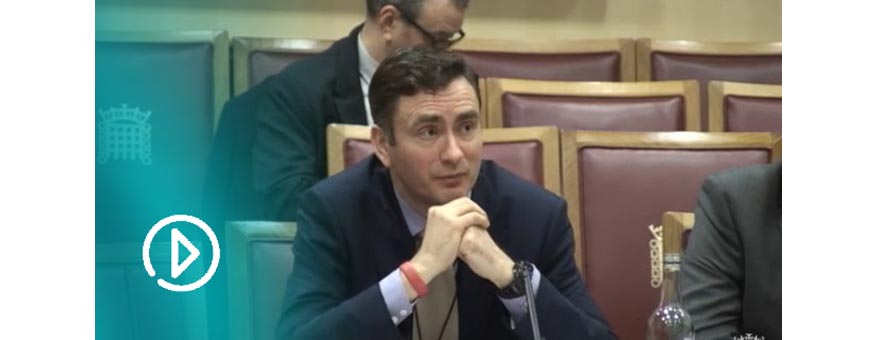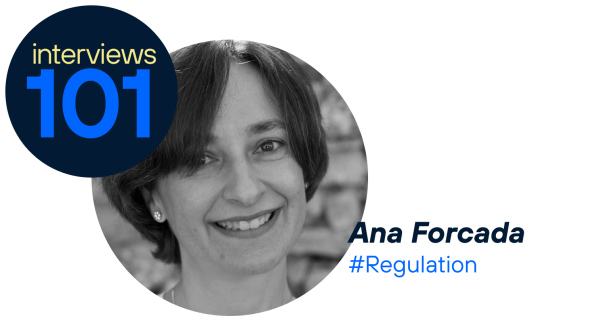Telefónica Public Policy & Telefónica España Regulatory teams
The UK’s upper chamber of Parliament, the House of Lords, recently invited Nicholas Blades, Director of Regulation, Competition and Data policy at Telefónica, and some representatives from BT Group, Ofcom and Viber, to give evidence about the telecom implications of the UK’s exit from the EU.
In the Public Hearing, the Chairman of the Committee asked the guests about their general views of the propositions within the new European Electronic Communications Code, which aims to stimulate competition and strengthen the internal market as well as consumer rights, and if this code could encourage investment.
Watch his intervention starting at 11:25:40
Nicholas Blades advocated in favour of not changing the code as adopted by the EU, once the UK leaves the EU. Variance between UK telecoms law and EU law is not expected to be an immediate post-Brexit problem, it is in fact a 10 year problem, he explained. In his view it would be more suitable to gradually introduce any required changes avoiding uncertainty in markets.
His main argument is that investments need regulatory certainty. Indeed, to grasp the opportunities that digitalization carry with it, more investments are required. Today stakeholders are involved in decision making about when and how they invest through the time horizon for Brexit, so certainty about a consistent regulatory environment immediately post-Brexit are key.
Regarding the so-called “ladder of investment” he used the Spanish best practice model as something the UK regulator should take into account. That experience shows, he said, that the imposition of price controls has a destructive effect on investment incentives.
“There are some lessons to be learnt around the way the Spanish regulator did not regulate some wholesale inputs in order to create the incentive for people to move up the value chain and invest in their own infrastructure”, he pointed out.
The new code would leave room for more experimentation by National Regulatory Authorisations (NRAs) on incentive structures, including in the UK, and therefore Nicholas Blades supported the positive impact on investment of the draft code proposed by the Commission.
Moving in the discussion with other guests, the question on competitiveness was raised, in particular, whether the code’s proposals is enough to deal with non-competitive oligopolies.
Nicholas Blades’ first assessment was that “oligopoly markets are not bad per se. There are many industries, especially those with high fixed costs, that tend to oligopoly.” He continued, “why does the telecom sector need a specific set of regulation to deal with a market structure that we see elsewhere?”
The Enterprise Act 2002 has a mechanism for the Competition and Markets Authority to investigate non-functioning markets, thus from a UK perspective, the existing legal framework already has the ability to deal with any negative consequences. Indeed he highlighted negative incentive effects that a per se regulation oligopolies in telecom sector proposed by the Commission could create. “Essentially you are saying to potential future investors, If you are successful and you build a competing infrastructure with the incumbent, you will be regulated; so why bother?, he said.
The draft telecoms code includes new symmetric regulations for sharing of infrastructure, even if operators do not have Significant Market Power.
In this regard, he expressed some concerns about the symmetric access proposal in Article 59 (3) of the draft code from the Commission, which establish mandatory sharing and authorizes NRAs under “exceptional circumstances” to change the coverage obligations in spectrum licenses after they have been purchased. This proposal in his view generates intolerable uncertainty to investors as the regulators could change the license conditions in unpredictable circumstances.
Indeed, the Commission’s proposals create a free rider problem, in that, “if you are required to share, everybody sits on their hands and waits for somebody to take the risk”.
Finally, the sub-committee discussed on spectrum, where Nicholas Blades stated that “the new frequencies [for 5G] are where the regulator has a role, because they are likely to be at much higher frequency than they are today. In relation to spectrum, it is a regional and global issue.”
He also remarked that the ITU and regional standardization is really important and used the example of 700 MHz which may be used for 5G, interference does not respect national borders, so UK has to move at the speed of its European partners.
“There’s a need for some form of spectrum co-ordination with Europe after Brexit, because with regard to spectrum the UK is not an island”.











